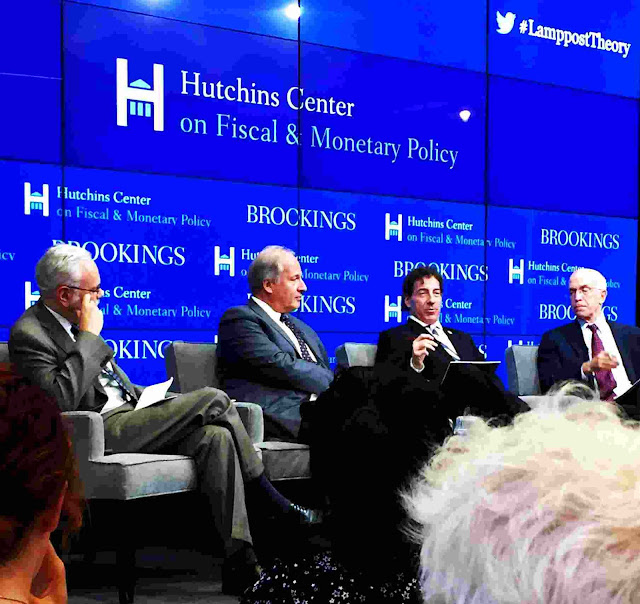On June 20th, 2017, the Brookings Institute invited Alan
Blinder, Representative Jamie Raskin, and Former Representative Vin Weber to discuss the "Lamppost Theory" – the tentative title for Blinder’s new book that seeks to explain why economic
policy often comes up short. Held in the Hutchins Center on Fiscal &
Monetary Policy, the discussion began with Blinder explaining what the book
title means. Blinder’s main argument is as follows: “Politicians use economics the way a drunk uses a lamppost –
for support, not illumination”
Blinder believes that the reason economists and
politicians have not had success working together to create effective
policies is because they hail from two completely different “civilizations”. He
believes both parties share blame for past policy failures and must learn from
each other. Blinder argues that economists and politicians measure success
differently, using a completely different set of criterion to make decisions.
Economists tend to use more logical, substantive, and idea-driven approach while
politicians focus on using people skills, gaining influence, and creating a
message. Furthermore, economists use longer time-frames while politicians
are subject to the election cycle and much shorter time-horizons.
Blinder describes policy formulation as a “four-ring
circus” that gives economists little influence on public policy. The four
“rings”, or phases of the process include: Substance, Politics, Message, and
Process. According to Blinder, economists become too focused on the substance
and fail to engage in the other phases of policy formulation. Blinder asserts
that most economists either do not understand or do not care for these parts of
the process, diminishing their potential level of impact on policymaking. Some
of the principles that economists need to learn from politicians include:
o Fairness beats
efficiency
o Unprincipled
compromises beat pure solutions
o Complexity sells
poorly (KISS principle)
o Need to
differentiate what is good from what sounds good
Blinder identified the three impediments to generating sound
policy as the 3 I’s: Ignorance, Ideology, and Interest Groups. Economic
literacy is very low, making slogans such as “protectionism saves jobs” sell
better than complex economic explanations. Additionally, Blinder believes that
while economists focus on theories that maximize social welfare and
macroeconomic conditions, politicians focus on special interests and policies
that benefit a narrow set of interests.
The second part of the discussion involved a panel moderated
by David Wessel, formerly of the Wall Street Journal and now Director of The
Hutchins Center. Rep. Raskin, recently elected to serve Maryland’s 8th
District, believes that economists need to change their approach by using newer
fields such as behavioral economics to influence public policy. Mr. Weber, one
of the most prominent lobbyists and strategists in the Republican Party, added
that part of the reason classical “technocrats” are not highly regarded in
politics is due to past failures. Weber points out that the 2008 financial
crisis and economists’ lack of ability to foresee it created an overall distrust
in economic expertise. (Of course, he is wrong about this. Only nonminority, mainstream economists missed the crisis. See: http://www.creativeinvest.com/InvTrackRecord.html , and Trump: https://www.linkedin.com/pulse/why-trump-win-william-michael-cunningham-am-mba - Ed.)
Reverting back to the 3 I’s, Blinder emphasizes that while
they may hold different values and theories, economists tend to be much less
further apart than politicians. Raskin admits that the current political
climate has compromise extremely difficult, making him become more of
demonstrator than legislator. Although he agreed that it has become much harder
to have an impact, Weber believes there is still hope. In order to fix this
problem, Weber believes we must try to figure out what people actually believe
in – not the slogans they sprout. Going forward, all three discussants
see a tremendous opportunity for economists to positively affect economic
policy. Though tax reform is the major issue area in which Blinder sees a need
for technical expertise, Raskin points out the war on drugs and campaign
finance as policy areas in which economic insight could play a
major role.
Takeaway: At the end of the day, economics is not an issue
area that many Americans understand. According to a study by FINRA Foundation,
nearly two-thirds (63%) of Americans could not pass a basic financial
literacy test, knowledge that has continued to decrease since the financial crisis.
In order to build coalitions for more effective economic policies, we must
start by making it a topic that the American electorate both cares about and
can follow. As Blinder points out, this will not be easy and will take at least
a generation of fundamental change. Although the long-term solution requires
changes to the K-12 curriculum and more emphasis on better economic/financial
press coverage, there are a number of online resources to help the
transformation. For absolutely no charge, individuals can enhance their
economic knowledge by taking online classes on topics such as Stock Investing
and Crowdfunding.
Additionally, we must figure out an create a superior
communication network between politicians and economists to improve fiscal
policy formulation. As Rep. Raskin points out, there is no real “neutral”
economic group or organization that Congress can rely on. Although Blinder
suggested a scenario in which a group of economic experts were selected to
rewrite the tax code with a set of goals and oversight provided by Congress, he
admitted that it was not a politically feasible solution. While I do not expect
Congress to relinquish its ability to create fiscal policy anytime soon, there
are incremental changes that can make economic policy more sound. In order to
eliminate the time-frame problem, we must consider remove election-cycle
pressures from affecting broad fiscal policy decisions. Politicians and
economists must be held to the same timeline, having a standardized set of
outlook and forecasting components that make analysis and comparison easier.
